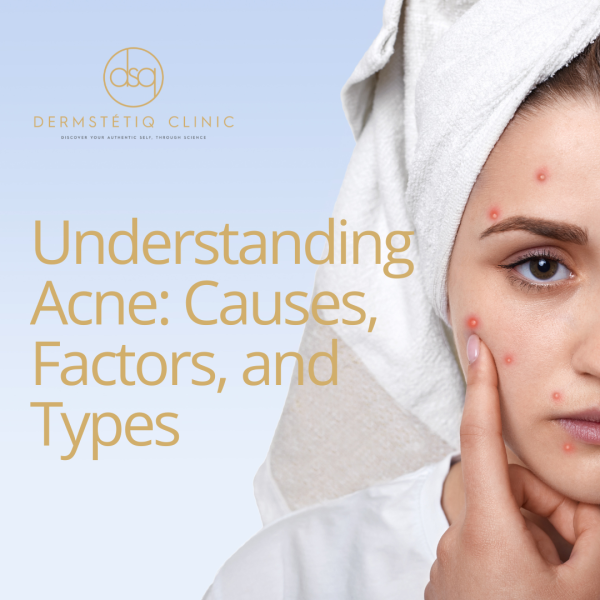
What Is Acne? At its core, acne is a skin condition that occurs when hair follicles become clogged with oil and dead skin cells. This clogging can lead to various types of blemishes, including pimples, blackheads, and whiteheads. While acne most commonly appears on the face, it can also affect other areas of the body such as the back, chest, and shoulders.
Understanding the causes of acne is crucial for effectively managing and treating this skin condition. Let’s explore some of the primary factors that contribute to the development of acne:
1. Excess Oil Production
Our skin naturally produces an oil called sebum, which helps keep our skin moisturized and protected. However, when the body produces too much sebum, it can lead to clogged pores and acne breakouts. Hormonal changes, stress, and certain medications can all contribute to increased oil production.
2. Bacteria
Propionibacterium acnes, or P. acnes, is a type of bacteria that lives on our skin. While it’s usually harmless, when pores become clogged, this bacteria can multiply rapidly, leading to inflammation and acne.
3. Inflammation
When the body detects clogged pores or bacterial overgrowth, it responds by sending white blood cells to the area. This immune response can lead to redness, swelling, and the formation of pus-filled pimples.
4. Dead Skin Cells
Our skin is constantly shedding dead cells. Sometimes, these cells can become trapped in our pores, mixing with oil and bacteria to form acne lesions.
While the basic causes of acne are relatively straightforward, numerous factors can influence its development and severity. Understanding these can help you better manage your skin health:
Hormonal Changes
Hormones play a significant role in acne development, especially for women. Fluctuations in hormone levels during menstrual cycles, pregnancy, and menopause can all trigger acne breakouts. This is why many women experience cyclical acne that worsens around their period.
Diet
The relationship between diet and acne is complex and often debated. While research is ongoing, some studies suggest that certain foods, particularly those high in sugar and dairy, may exacerbate acne in some individuals. On the other hand, a diet rich in fruits, vegetables, and omega-3 fatty acids may help improve skin health.
Stress
We’ve all heard that stress can cause breakouts, and there’s truth to this claim. When we’re stressed, our bodies produce more of the hormone cortisol, which can increase oil production and inflammation, potentially leading to more acne.
Genetics
If your parents or siblings have struggled with acne, you may be more likely to experience it as well. Genetic factors can influence how your skin responds to hormones and how prone you are to developing clogged pores.
Skincare and Makeup Products
Using the wrong skincare or makeup products can sometimes worsen acne. Products that are too heavy or oil-based can clog pores, while those containing harsh ingredients may irritate the skin and trigger breakouts.
Acne comes in various forms, each with its own characteristics. Understanding the different types can help you better identify and treat your specific skin concerns:
1. Whiteheads
These are closed comedones, where the pore is clogged but remains closed at the surface. They appear as small, flesh-colored bumps on the skin.
2. Blackheads
Open comedones that appear as small, dark spots on the skin. The dark color is not due to dirt, but rather the oxidation of sebum and dead skin cells when exposed to air.
3. Papules
Small, red, raised bumps caused by inflamed or infected hair follicles. These are often tender to the touch.
4. Pustules
Similar to papules, but filled with pus. These are what most people think of as a typical “pimple.”
5. Nodules
Large, solid, painful lumps beneath the surface of the skin. These are deeper than papules and pustules and can last for weeks or months.
6. Cysts
Deep, painful, pus-filled lumps beneath the surface of the skin. These are the most severe type of acne lesion and are most likely to cause scarring.
While acne is a prevalent skin issue, it’s not the only concern that many people face. Let’s briefly touch on some other common skin problems:
色素沉着
Pigmentation refers to dark patches or spots on the skin, often caused by sun damage, hormonal changes, or as a result of acne scarring. These can be challenging to treat and may require professional interventions like chemical peels or laser therapy.
Dry and Sensitive Skin
Many women struggle with dry, flaky, or sensitive skin. This can be due to genetics, environmental factors, or certain skincare products. Finding the right balance of hydration without triggering acne can be a delicate process for those with both dry and acne-prone skin.
Rosacea
Often mistaken for acne, rosacea is a chronic skin condition characterized by redness, visible blood vessels, and sometimes small, red, pus-filled bumps. It typically affects the central part of the face and can be triggered by factors like spicy foods, alcohol, and temperature changes.
Enlarged Pores
While not a medical condition, enlarged pores are a common cosmetic concern. They can be caused by genetics, age, sun damage, or excessive oil production. While pore size can’t be permanently changed, certain skincare practices can help minimize their appearance.
Understanding acne and other skin concerns is the first step towards achieving healthier, clearer skin. Here are some tips to help you manage your skin health:
Dealing with acne and other skin concerns can be frustrating, but it’s important to remember that you’re not alone. Millions of people around the world share similar struggles. By understanding the causes and types of acne, as well as other common skin issues, you’re better equipped to take control of your skin health.
Remember that clear, healthy skin is a journey, not a destination. Be patient with yourself and your skin, and don’t hesitate to seek professional help if you’re struggling. With the right knowledge, care, and sometimes professional guidance, you can work towards achieving the healthy, glowing skin you desire.
Whether you’re dealing with occasional breakouts, persistent acne, or other skin concerns like pigmentation or rosacea, know that there are solutions out there. Keep learning, stay consistent with your skincare routine, and above all, be kind to yourself and your skin. After all, our skin tells the story of our lives – blemishes, scars, and all – and that’s something to be celebrated, not hidden away.
At Dermstétiq Clinic, Dr. Tan Hui Suan and her team are committed to providing personalised care and expert advice to address a wide range of dermatological concerns. Whether it’s acne, hyperpigmentation, premature aging, or other skin issues, their comprehensive approach ensures patients receive the best possible treatments tailored to their unique needs. By staying informed and proactive about skin health, patients can achieve and maintain beautiful, healthy skin.
DSQ Elite proudly stands as the official distributor of multiple world-renowned, scientifically-proven effective skincare, haircare, and weight loss products. Our journey began with a simple yet profound commitment: s to unlock the power of cutting-edge research and technology to create products that go beyond the surface, delving deep into the science of beauty.
Call us at +65-69800878 or submit the following form to make an appointment.

© Dermstetiq Clinic Pte Ltd. All Rights Reserved 2026